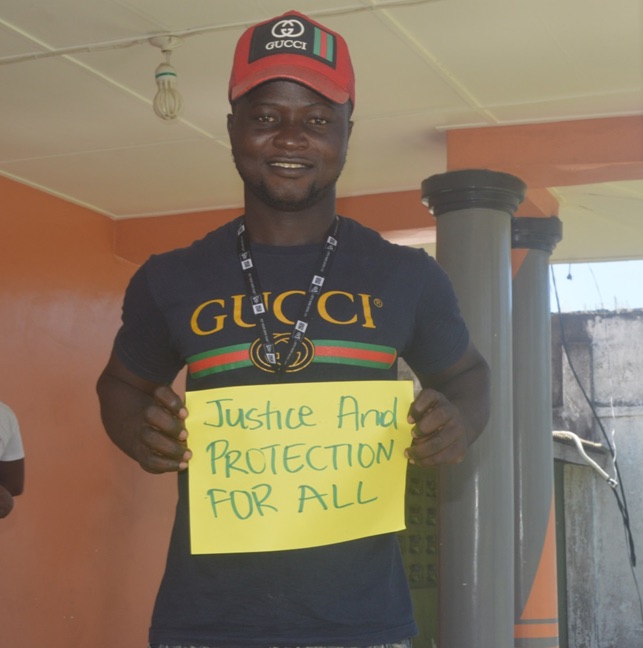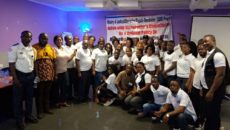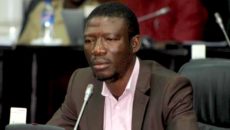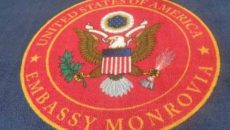MONROVIA, Montserrado – In March 2019, a gay man reported being attacked and severely brutalized at a local club in Monrovia, after his attackers identified his sexual orientation.
The victim disclosed that the matter was reported to the Airfield police depot, where he was asked to first seek medical treatment before pursuing his case. He said the depot’s commander had assured that he knew the perpetrators of the violence and would have them arrested when the case is being heard. But since then, the attackers, including their leader, who is said to be a notorious criminal, continue to be on the run.
“To be real I’m very scared now to even know if I’m safe in my country anymore because this guy is actually a notorious criminal. I don’t know what will happen next,†the victim disclosed in an email. His name is being withheld because of the unsafe environment for homosexuals in Liberia.
The leadership of Stop AIDs in Liberia or SAIL has since reported the incident and called on the Ministry of Justice and other authorities to launch an investigation, but the victim told The Bush Chicken on May 20 that no investigation has been done since the incident was reported.
The LGBT community in Liberia continues to struggle for equality against the backdrop of a country that largely views them as the antithesis to their culture. Members say they lack basic freedom. Members have also, consistently complained of being denied basic treatment and other healthcare delivery services by health workers sometimes refusing to give them treatment.
In light of this environment, the Liberia Initiative for the Promotion of Rights, Identities, Diversity, and Equality, also known as LIPRIDE, has ended activities in observance of this year’s International Day Against Homophobia, Transphobia and Biphobia.
Officially observed on May 17 each year, the day represents a major global annual landmark to draw the attention of decision-makers, the media, members of the public, including corporations, opinion leaders, and local authorities to the alarming conditions faced by people with diverse sexual orientations, gender identities or expressions, and sex characteristics.
The celebration took place in Monrovia with a roundtable engagement of partners to discuss strategies aimed at reducing stigma and discrimination.
Speaking during the roundtable discussion, the executive director for the Union of Muslim Association of Bomi and Gbapolu, Sheikh Swaray, stressed the importance of tolerance in addressing the current challenges in the country’s health system.
Swaray, who is also an anti-HIV campaigner as well as sexual and reproductive health and rights expert, encouraged members of sexual minority groups to hold together in advancing advocacy against stigma and discrimination against them.
Senior U.N. officials also called for respect for sexual and gender diversity and urged the protection of lesbians, gays, bisexuals, and transgenders, also known as LGBT.
“Today, I am deeply concerned by the excessive trivialization of insults, sexist and homophobic remarks in the media, in everyday life, on social networks, even from political leaders,†UNESCO’s Director-General Irina Bokova said in her message celebrating the global day.
Bokova recalled where under the Nazi regime, homosexuals were interned in ‘re-education camps’ and killed. She said the U.N. was created to prevent such crimes from happening again. She stressed that UNESCO is committed to protecting the rights of homosexual and transgender people by drawing across its mandate to advance education, the sciences, culture, communication, and, information.
“These are powerful tools to fight the prejudice, verbal violence, and stigmatization that foreshadow physical violence and that violate the equality and inherent dignity of all. This work for reason and tolerance begins on the benches of school,†she also said.

In Liberia, there is no law specifically criminalizing homosexuality, but there is a law against “deviate sexual intercourse,†which may not only be difficult to prove if it occurs between two consenting adults, but it also could include a host of sexual acts that even heterosexual individuals often engage in.
Despite the struggle by the LGBT community for equality in Liberia, their sexual diversity is widely seen as a contrast to the country’s culture.
Meanwhile, a member of the Liberia Human Rights Platform, Losaone Gray, has pledged the organization’s support and commitment to working with LIPRIDE in discouraging hate messages against people based on their sexual identity.
“No one group of people have supreme rights over others,†Gray said, noting that every human should be allowed to freely choose what to do without being harassed, once their activities do not violate the rights and freedoms of others.
Also speaking at the start of the roundtable discussion was LIPRIDE’s coordinator, Maxwell  Monboe, who said the observance of the day represents a significant step for likeminded organizations to enforce efforts in discouraging hate actions meted against people based on perceptions.
According to Monboe, LIPRIDE, as a leading civil society coalition in the country, considers the annual observance of the international day to be important because it reminds society of the need for people’s rights to be respected without preconditions. He also encouraged members to hold together and continue to engage state actors on various rights protocols, noting that respect for people’s right is a guarantor for sustainable peace, in any society.
A number of civil society organizations in Liberia working on human rights issues, sexual and reproductive health and rights, and other related issues participated in the roundtable discussion.



